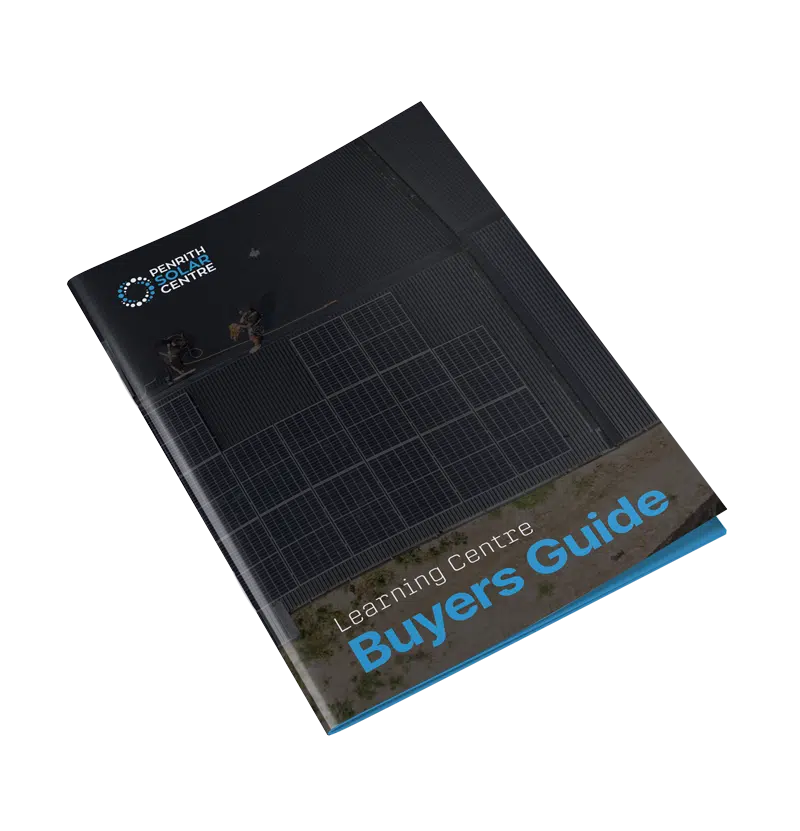You’ve ordered a solar system and you’ve selected an in-house installer who has taken you through most of the design process. The salesperson has yet to stop by your home for a site inspection. The last time you spoke with them (by phone, text, or email), they mentioned that there might be aspects of the property that could potentially affect your quote.
Why is that the case? Well, tricky installations often require more days to install a system. More days to install the system means there’s going to be an additional day of labour, which means thousands of dollars added to the price of your system which will directly affect your payback period and return on investment.
Every solar system installation is unique. You will have unique energy needs, which will affect the size of your solar system. Your home is also different from your neighbours, which will require different limitations around roof space, cable runs, and other factors. The time it takes to install your solar system will be different from everyone else on your street.
If you understand what impacts the length of your installation, you won’t be surprised if we need to add a day to your quote once we arrive for a site inspection. We don’t charge for additional days once we’ve quoted an installation.
At Penrith Solar Centre, we understand every possible hiccup that could potentially slow down an installation. From complex wiring to a second array on a nearby shed, we’ve seen it all. There are dozens of variables that could slow a crew down, especially if you have more than one on your property.
In this article, you will learn:
- How Does the Size of My System Affect My Installation?
- How Does the Roof Affect My Installation?
- How Does Different Equipment Affect My Installation?
- How Does My House Affect My Solar Installation?
- How Does Removing My Broken String System Affect My Solar Installation?
- What Is a Speedy Installation?
By the end of this article, you’ll have a firm grasp of the factors that contribute to lengthening your solar system installation.
How Does the Size of My System Affect My Installation?
The size of your solar system will definitely affect the time of the installation. While this sounds logical to most folks (more equipment means more time to set it up), some are disappointed to discover that a larger system will take longer to install.
- 10 – 39 panel system, you can anticipate at least a day of work.
- 40 – 78 panel system, you can anticipate at least two days of work.
- 79 – 85 panel system, you can anticipate at least three days of work.
Anything larger than 85 panels is quoted differently and the metrics are different.
There are additional factors on each site that could also add days to your installation.
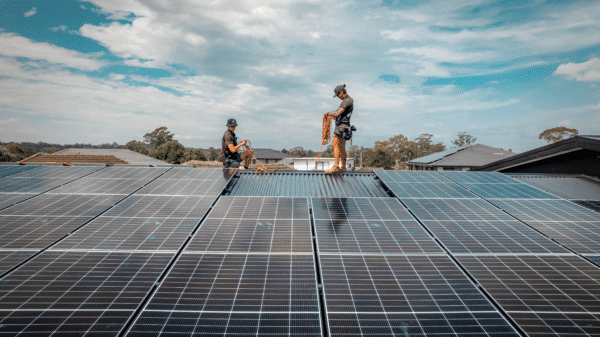
If you’re interested in learning more about what size solar system you need, you might want to check out the following article titled, How Much Solar Do You Need?
How Does the Roof Affect My Installation?
Solar goes up on your roof – we can all agree on that. Of course, there are exceptions that prove the rule like solar farms that stretch across swatches of the desert, but for the most part, the real estate solar panels take up is up on the roof.
Your roof is different from your neighbours and the design of the roof faces is an important part of determining the design of your solar system. In order to maximise their exposure to sunlight, a solar consultant will work with you to figure out where to put your panels on the roof in response to your needs.
If you’re interested in learning a bit more about how a sales expert evaluates and works with you to figure out where your panels will go, you might want to read the following article titled, Which Way Should Solar Panels Face in Australia?
Some roofs have tricky aspects to them that slow the installers down. Here are a few, and it’s by no means a comprehensive list. It should give you a general idea of what to identify on your roof that will slow the crew down.
Tiles
- Terracotta roof tiles – they’ll slow the crew down a little bit.
- Swiss Terracotta roof tiles – they’ll slow the crew down a lot.
- Shingle Terracotta roof tiles – they slow the crew down the most and automatically require an additional day for the installation.
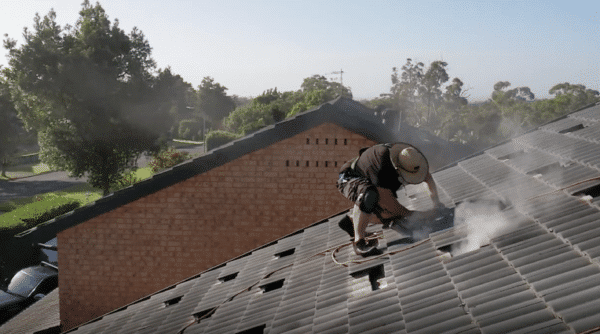
Pitch
“Pitch” is the word we use to describe the angle of the roof’s slope. The steeper the roof pitch, the more challenging it is for installers to climb on to install solar panels.
- 25° – 29° sometimes this will require an additional day if there are a lot of other variables to consider.
- 30° – 39° usually requires an additional day depending on what other factors might slow the crew down.
- 40° or steeper will require a minimum of an additional day.
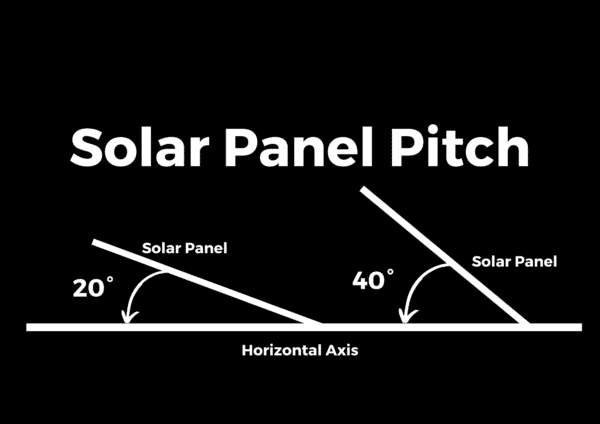
Roof Faces/Banks of Panels
Solar panels are grouped together in sections called a “bank.” In a bank of panels, all the panels are connected to a trunking cable, which is how the power gets from the panels to the main switchboard.
Banks of panels are split across roof faces – which is a section of the roof that faces a different direction than the rest of the roof. For example, if your home has a peaked roof, one roof face is facing east, and the other is facing west. These are both roof faces.
The number of roof faces/banks of panels will slow down your installation crew. They’re separate arrays that are connected by different trunking cables to feed the main switchboard.
- 4 banks/faces will slow down the crew but not necessarily extend the installation.
- 5 banks/faces will most likely add a day to the installation.
- 6 banks/faces or more absolutely will add a day to the installation.

If you’re interested in learning more about how your roof might affect your installation, you might want to check out the following article titled, How Does Your Roof Affect Your Installation?
How Does Different Equipment Affect My Installation?
Different installations sometimes require creative approaches to wiring. There are all kinds of variables that might slow down the installation team depending on the electrical parameters of the home.
Any one of the following will not add a day to your installation. But when you start adding them together, they can stack up to require an additional day, especially if they’re combined with any of the limitations on the property.
Such as:
- Removing/replacing/upgrading an internal wall sub-board (if it’s being used for solar). A sub-board is an industry term used to describe a secondary “switchboard” within a home (please don’t tell an electrician that I just called it that to define it). If you were to live in a townhouse, for instance, your main switchboard would probably be near the meters for the property and the sub-board would be in the individual units.
- Non-conventional switchboard (old and not hinged). In days of yore, switchboards did not have a nice hinge on them like they do now. It was hard for electricians to reach into the back of the switchboard to make adjustments. One day, a crafty electrician said, “Hey, guys. Let’s put a hinge on it so we can swing it out and do our work more easily.” And the hinged switchboard was born. If you don’t have one of these, it will add time to your installation.
- A second Envoy needs to be installed at the sub-board. The Envoy is a piece of technology that collects data about your system and sends the data over the Internet to MyEnlighten (the Enphase App) so that you can monitor your system’s performance. If there’s a sub-board as part of the installation, there’s a chance a second Envoy might be necessary. This will add time to the installation, maybe another day if combined with other complicated variables.
Working with how electricity is diverted can be complex, and rewiring panels takes time if the panel is difficult to work with. There are also some complications if you’re installing a solar battery (or more) on a three-phase home. But that gets difficult to explain in layman’s terms. Just know that there are limitations to diverting that electricity properly.
If you’re interested in learning more about what a three-phase home is, you might want to check out the following article titled, Single-Phase vs. Three-Phase: How Are They Different?
How Does My House Affect My Solar Installation?
We’ve said it before in the introduction, installations are as unique as snowflakes. Every home and every family’s needs are going to be unique. The architecture of your home will affect your installation.
- Two storey or split-level homes will slow down the install crew as they navigate climbing up and down longer ladders and getting the equipment up an extra storey. This might require an extra day if it’s combined with other variables mentioned earlier.
- If your home has limited access for our truck to park or no driveway at all, it just takes longer for the crew to get to and from the site and the truck to unload and load up equipment. Anything over 30 metres away from the site might add a day.
- Two storey home with an attached flat roof garage can affect the cable run to the main switchboard depending on a few factors. It takes time but might or might not add an extra day.
- Panels across multiple buildings is a big one for our crew. It will slow down the installation and you can probably expect another day for that installation.
- Double storey or split-level homes with cladding or Hebel on the outside slow the crew down quite a bit when it comes to running the wiring from the solar to the main switchboard. If your home has this on its exterior, it will probably be an additional day depending on other factors.
- Terrace homes with any number of panels are automatically assigned an extra day. A terrace home is a property that is linked, side-by-side, to a row of other homes. You don’t typically see them out west in Penrith, but downtown where space is expensive, a lot of homes are right on top of each other, and we will have trouble getting up on the roof.
How Does Removing a Previously Installed System Affect My Solar Installation?
This is a pretty simple one to answer. Removing a faulty solar system after its warranty expires is pretty common for us. We are a solution for a lot of folks who are dissatisfied with the performance of their inexpensive solar system.
Removing a solar system usually adds a day to the installation.
- 30 panels or less might add a day, the boys might be able to get it down and put up a new one in a day. It just depends on how complex that installation is.
- 31 or more panels almost always add an additional day to the installation.
What Is a Speedy Installation?
This can be figured out by working backwards from all the stuff we use to add days to an installation and working backwards.
Of course, the variables we mentioned earlier are extremely common. It’s less common to find a home that doesn’t have any complications to it. But if your home is the following and none of the preceding, you’ll have a speedy installation. They might even be done by lunch.
- Tin/metal roofs are easier to work on (if it isn’t raining).
- Pitch of less than 25°.
- Single storey home.
- Easy access to the main switchboard (and it’s on hinges).
- Panels are all installed on a single roof face.
Ready, Willing, and Cable.
Now you can identify the multiple variables our installation team takes into consideration when answering the inevitable question when it pops up: how long will it take?
It depends.
Every home is unique, and everyone’s needs are unique. Some installations are short, and others are long. If you understand what impacts the length of your installation, you won’t be surprised if we need to add a day to your quote once we arrive for a site inspection.
At Penrith Solar Centre, we are committed to working with you to find a solution to your solar needs within the specifications of your property. We’re collaborators and innovators who will work with you to make sure you’re happy with your installation.
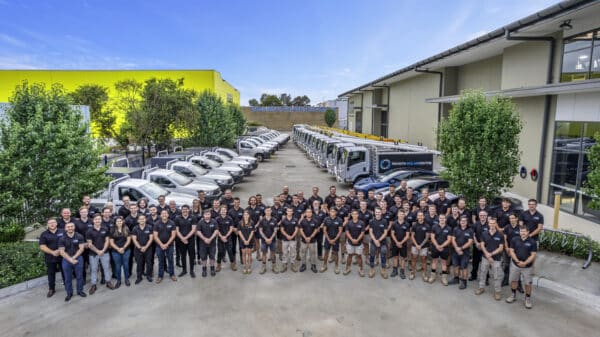
If you’re interested in learning more about accounting financially for an extra day or two to your installation, you might want to read the following article titled, What is the Payback Period for Solar Panels in Australia?
